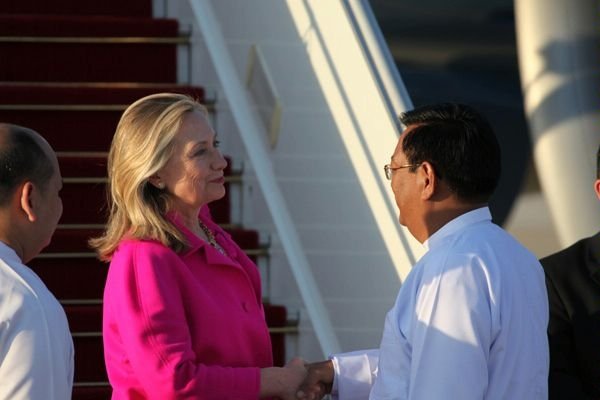Clinton sees signs of opening in Myanmar

Photo courtesy of the State Department
Sec. of State Hillary Clinton is greeted by Burmese Deputy Foreign Minister Dr. Myo Myint as she arrives in Nay Pyi Taw to begin her historic visit to Myanmar on Wednesday, Nov. 30, 2011.
December 2, 2011
At the conclusion of her landmark visit to Myanmar Friday, U.S. Secretary of State Hillary Clinton said she saw some encouraging signs in the changes underway in the country.
For the second day, she met with Aung San Suu Kyi, the Nobel Peace Prize winner who intends to run in upcoming parliamentary elections with her newly registered political party.
“We do see openings today that give us some signs of encouragement,” Clinton said. “We want to see this country take its rightful place in the world.”
Clinton met with Suu Kyi at her home, where the activist spent most of the last two decades under house arrest imposed by Myanmar’s military regime.
“Because of this engagement, I think our way ahead will be clearer and we will be able to trust that the process of democratization will move forward,” Suu Kyi said.
The new government has shown encouraging signs of reform and has released some political prisoners, but the activist said that all such prisoners must be released and that no one should be arrested for their beliefs.
“All hostilities must cease in this country,” she said.
The road to democracy in Myanmar is closer than before, but there is still a ways to go, she added.
“We are not on that road yet, but we hope to get there as soon as possible with the help and understanding of our friends,” she said.
Clinton became the first U.S. secretary of state to visit the country in 50 years.
Clinton was in Myanmar to urge democratic reforms. Suu Kyi is regarded as the Southeast Asian country’s leading reformer for democracy.
Clinton’s trip was made possible by the nation’s unexpected steps at democratic reform.
Ruled by a junta since 1962, Myanmar elected Thein Sein to the presidency in March. The new government freed dozens of political prisoners in October.
On Wednesday, Suu Kyi — released since November of last year from her latest round of house arrest — said she intends to run for parliament.
The developments stirred optimism among U.S. officials, who refer to the country as Burma — the name it used before the junta took power.
The trip, the White House said, indicates that the time could be right for the two nations to forge a new relationship.
Still, Myanmar is far from a democracy — and skepticism exists on both sides.
Journalists in the country enjoy new freedoms, but their work remains heavily regulated. Ethnic violence still occurs against Myanmar’s minorities, and human rights groups estimate that more than 1,500 political prisoners are still detained.
Suspected cooperation between the government and North Korea on ballistic missiles and nuclear activity also is troubling to the United States.
As a result, the Obama administration is not ending sanctions and is not making any abrupt changes in policy.
For its part, Myanmar offered a cordial welcome to Clinton — but the visit was low key.






